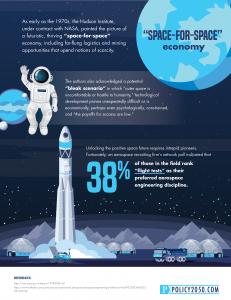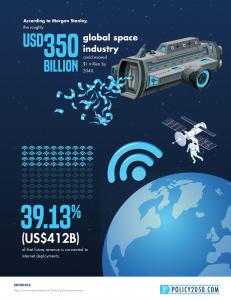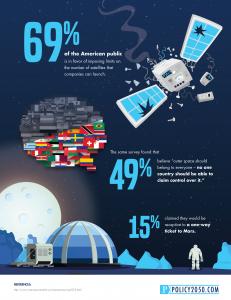
The new Policy2050 analysis offers an intricate exploration of opportunities, hazards, and the interconnected space narratives of past and present.
SAN FRANCISCO, CALIFORNIA, USA, August 14, 2023/EINPresswire.com/ — A holistic analysis from Policy2050.com juxtaposes the dreams of yesteryears with the dynamism and drawbacks of today’s commercial space industry. It’s part of a new initiative that promotes interdisciplinary innovation and engagement. A meticulous blend of analysis and forecast, the “Deep Tech” membership-supported whitepaper is bound to reshape our understanding of the NewSpace sector.
The commercialization of Low Earth Orbit (LEO) presents opportunities intertwined with risks, notably space junk and satellite collisions. Slingshot Aerospace, with its advanced analytics and partnerships with institutions like the U.S. Air Force and NASA, exemplifies the potential and the preparedness required in this NewSpace economy.
Diving deeper, the document underscores the tech sector’s underachievement in contrast to the ambitious “moonshot” ideas of the past.
The current space era, with self-landing rockets and proliferating satellites, still pales in comparison to the “optimistic scenario” of a 1970s Hudson Institute report, which had envisioned asteroid mining as a mainstream occupation. Though that report’s authors’ speculative optimism might be forgiven, given the moon landing’s euphoria, the report, ironically enough, starkly differentiated itself from “relatively undisciplined” science fiction. Taking the view of the genre espoused by author David Brin, science fiction is at its best when it’s akin to a speculative history, or a thought experiment – the technique behind Einstein’s foremost contributions to theoretical physics, no less. In such conceptualizations, science fiction can also be socially constructive, suggests Brin. George Orwell’s “Nineteen Eighty-Four,” for instance, caused people to gird themselves against the realization of a dystopian “Big Brother” scenario.
Among its market forecasts and aerospace startup case study, the Policy2050 analysis delves into such perspectives since they help to map out the stars – pointing to the immense opportunities and challenges the NewSpace economy presents today.
With “The NewSpace Economy: Preparation and Risk Management” whitepaper by authors David Pring-Mill and Matthew S. Williams, readers can learn more about aerospace startup strategies, advanced analytic solutions, space junk, and these lost predictions of yesteryears. Embracing the era of collaboration, Policy2050’s release is not a solitary endeavor.
Historically, Policy2050 has maintained its globally distributed market research for business leaders, investors, and governments behind paywalls, while releasing selected highlights with societal relevance. However, with the increasing imperative to foster cross-sector collaboration to address a daunting risk landscape, Policy2050 is now expanding into membership-backed, publicly available research and analysis. The release of “The NewSpace Economy: Preparation and Risk Management” whitepaper marks the commencement of this initiative, whereby innovators can help to break down siloes and keep innovation ahead of global threats and crises. Our new membership model is not just about funding quality content, but about co-creating it with the brightest minds from different spheres.
Members who join this exciting initiative will enjoy several exclusive benefits:
1. Early Access: Be the first to be notified of ground-breaking whitepapers in the Policy2050.com Quick Insights section.
2. Editorial Participation: Vote on future content directions.
3. Network and Connect: Interact with like-minded innovators, industry leaders, and policymakers from various sectors.
Policy2050.com invites thinkers, leaders, and innovators to join in the launching of this new endeavor at: https://www.policy2050.com/memberships/
ABOUT POLICY2050.COM
Policy2050 is a tech-focused research firm dedicated to crafting insightful reports and whitepapers on a wide range of topics. We seek to influence the future of tech policy and business strategy in order to bring about a sustainable, fair, and vibrant economy. Drawing parallels between science fiction’s predictions and the commercial space industry’s unfolding reality, the latest whitepaper reflects our Deep Tech Membership initiative. When innovators join this tier, they’re making a statement – that they choose substance over surface, innovation over imitation, and potential over precedent.
David Pring-Mill
Policy2050.com
david.pringmill@policy2050.com
Visit us on social media:
Twitter
LinkedIn
![]()





